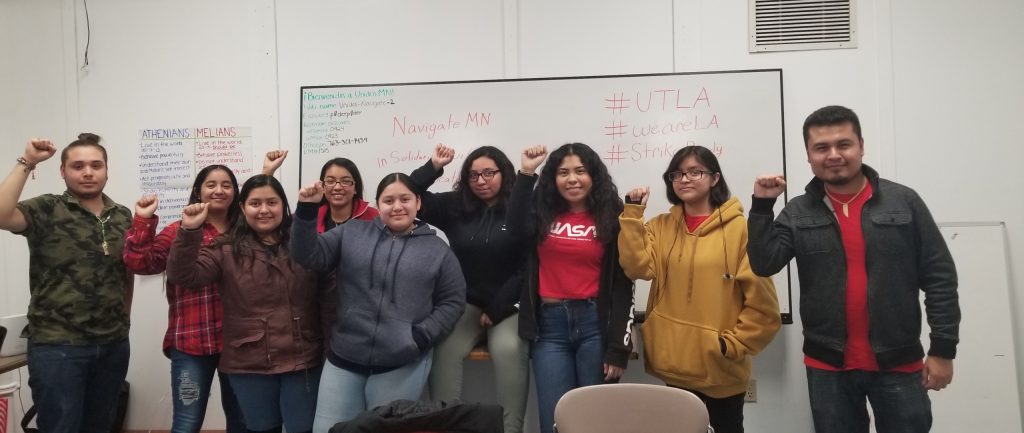By Poder Unidos and Jose Alvillar. This post is the fourth in a new blog series on stories of education for liberation work happening in the Twin Cities and surrounding region, leading up to the 2019 FMFP conference.
About a year ago Navigate MN, a grassroots power-building organization that builds power for gender, racial and economic justice, asked itself: Why do our schools continue to fail our students? Though the answer in itself is complex, one thing became clear and that is that we need to invest in our own learning, relearning, and unlearning as a community. As many before us have created their own curriculum centered in our own stories, we sought to do the same.
In the summer of 2018, we launched our first ever Youth Action Summer Camp. Its intentions like many other action camps across the country were centered in honoring the dignity and self-determination of our youth. The camp was grounded in a Nican Tlaca (people of the Americas) perspective through a popular education framework that interconnected our struggles, but also reframed youth organizing, not as our future leaders, but our current ones. It was out of this belief and investment in their leadership that our work for ethnic studies came about.
The reality became clear that much of what we do and learn in community is not reflected in our schools, that the knowledge of our ancestors and our own histories are not present in our schools, or if they are, they are through a deficit lens that portrays our people as relics of the past when we know very well that we’re still here, that our elders struggles were not and are not in vain. For that reason among many others our youth from Poder Unidos, a youth group of predominantly Latinx youth, have been working on ethnic studies work across the Minneapolis Public Schools district and have developed a plan to take it to the state via an ethnic studies bill.
However, like any struggle, there will always be barriers. Currently, we face a lack of funding, not enough teachers of color, implementation challenges, outdated and irrelevant curriculum, accountability from districts and leadership, among many other things. However, these barriers have only reminded us how important this work is and why we need ethnic studies in our schools. As some of our youth so beautifully say: we need it because it’s “our history, our schools!”
One of our youth leaders, Adriana Castaneda, expresses her journey via our camp: “I joined one of Navigate’s group called Poder Unidos after participating in their Youth Action Summer Camp in the summer of 2018. Through Poder Unidos, I’ve learned that many schools in Minneapolis do not offer Ethnic Studies as one of their classes. Ethnic Studies teaches the history of people of color. Since I am the daughter of two Mexicans, I would’ve liked having this class in my school because me, along with others could learn about the history of people with different racial backgrounds.”
As they/we continue on this journey we are reminded that we do this for others and ourselves. That the struggles of our elders, parents, and our young ones will be worthwhile. We are also reminded that we cannot win this on our own, that for us to win ethnic studies, we must do it in community and with the community. That the stories of our parents, educators, organizers, and younger ones are just as important because these are our schools!
